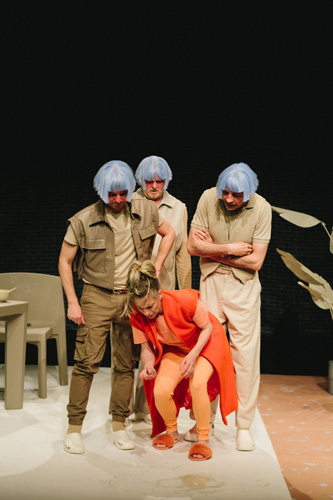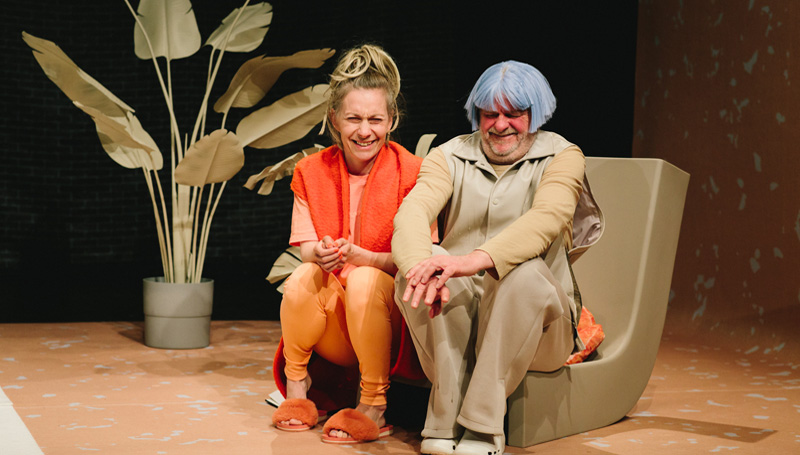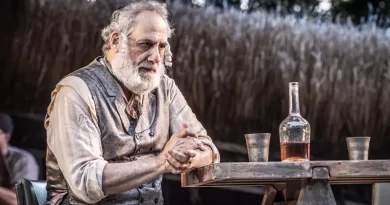“The Cigarette Empire” (“Every Dream Comes To An End”)
22 April 2022
Das Zigarettenreich (Jeder Traum hat ein Ende), Werk X- Petersplatz
Ludovico Lucchesi Palli in Vienna.
The newest production at this theatre located in the heart of Vienna is a co-production with the Verein für gewagte Bühnenformen, penned by acclaimed author Marc Carnal and directed by Klara Rabl, who previously directed Feed the Troll at the same venue.

The Cigarette Empire.
Photo credit: Apollonia Theresa Bitzan.
The play, which in English translates to The Cigarette Empire (Every Dream Comes To An End), investigates what the underground world to which mean disappear when claiming that they are off to buy a packet of cigarettes might look like.
As we enter the theatre, three of the actors are already on stage. They all wear blue wigs and are dressed in beige. The set consists of beige chairs, a table, a plant and toilet paper. The wallpaper is beige as well with a large piece of paper covering one half of the wall. The three protagonists are eating out of a bowl, drinking, and quietly reading. The fact that they’re already on stage and actively doing something enables audiences to be immediately drawn into their world, which is quite effective. Unfortunately, though, the opening dialogue doesn’t help to introduce the setting in any way, but as the play unfolds, all is revealed.
The three gentlemen Paul Sittich, Habermann and Oskar Bruhn have spent years stuck in Cigarette Empire, an underground world in which they work and live, far away from their real lives. To enter, you need to know the secret code, which is a combination that needs to be entered when buying cigarettes from any vending machine.

The Cigarette Empire.
Photo credit: Apollonia Theresa Bitzan.
Their days consist of working for a tobacco factory and as reward they are allowed to live there free of charge. They are expected to be present at a roll call once day and to go to gymnastics classes. If they fail to do so, they are punished. Occasionally they are tested, a pass leads to reward and failure to punishment. It appears that they are happy, despite the strict regime. Their carefree life is interrupted by an unexpected visitor. Not only is the visitor unexpected, but also it is a woman, who, as we find out later, wouldn’t ordinarily be allowed to enter at all. Frieda Polak is unaware how and why she got there. The three men welcome her to their world, at first with hesitation, but eventually with open arms. The more they tell her about their life in this underground world, the more she questions it and wants to escape without knowing that there is no way out.
The cast consists of Karola Niederhuber (Frieda Polak), Martin Hemmer, Alexander Mitterer and Florian Tröbinger. Karola Niederhuber brings a lot of confusion and anger to her role, combined with a forceful stage presence throughout. Florian Tröbinger as Oskar Bruhn portrays the looser of the three but does so charismatically, Martin Hemmer as Paul Sittich on the other hand, portrays the most self-confident of the three, and Alexander Mitterer as Habermann is the most childish and naïve.

The Cigarette Empire.
Photo credit: Apollonia Theresa Bitzan.
Marc Carnal’s text is an interesting exploration of the subject matter, although it might be argued that is is a very male perspective. As the author revealed at the press launch, the inspiration for this piece came from the novel Indigo by the Austrian Clemens Seitz who gave his blessing for this play to be written. The men are the strong ones here and are rewarded for dutiful work. By rights, there are no women in this world. Does this indicate that the creative though process comes from a male point of view?
Here the phrase “going out for a pack of cigarettes” is not only the basis of the underground world that is created, but it should also be viewed in a literal sense. All the events are presented in a way that they are to be taken seriously even if they are completely crazy. The acting is also never over the top. With the sets by Sophie Tautorus, director Klara Rabl manages to create an intimate production which is indeed at times humorous but also thought-provoking as it questions whether an underground world of this kind is better than real life. Do we really need to escape to be happy? This is a key question in the play.









